During the Covid-19 pandemic, medical staff at Beaumont Ward, part of the Bradgate Unit in Leicestershire, expressed grave concerns over patient safety, fearing “catastrophic” events were “likely” due to perceived risks. This was revealed during an ongoing employment tribunal involving the Leicestershire Partnership NHS Trust (LPT), which runs mental health services in the region.
Beaumont Ward was designated as an admissions ward at the start of the pandemic recovery phase, concentrating patients with more complex and acute needs in a single location. Staff worried this concentration put undue pressure on employees and heightened safety risks. Following these concerns, the ward’s risk rating was raised to 20 out of a possible 25, signifying that a catastrophic event was “likely”. Staff had petitioned for the rating to be increased to 25, the maximum level indicating that a catastrophe was “almost certain”, but the trust declined to do so.
The tribunal is part of an employment case brought by Dr Mariam Benaris, a former consultant on Beaumont Ward, who alleges that she was mistreated by the trust after whistle-blowing over these patient safety concerns. The hearings have revealed claims that failings on the ward during the pandemic period contributed to the deaths of patients, including one patient who absconded from the ward’s garden before dying by suicide—a total of three patient deaths from this timeframe are under review.
During the tribunal, Michelle Churchard-Smith, then head of nursing for the Adult Mental Health Directorate in Leicestershire, acknowledged that staff recognised the potential for “huge risks” on the ward. She stated that the trust conducted “conversations” focused on control measures intended to “reduce” risks and put “mitigations” in place. Despite this, the risk rating was lowered to 12, considered “moderate”, shortly after the death of the patient who absconded, a decision criticised by Dr Benaris’s barrister, Oliver Isaacs. Mr Isaacs highlighted reports of staff being “abused” and patients “assaulted” in the period leading up to this downgrade, saying: “If you have a situation where staff are being verbally abused and threatened with violence, and patients are being assaulted, you can’t have put in effective mitigation.”
The tribunal also heard about the operational changes during the pandemic that impacted patient management. Beaumont Ward became the sole intake for new admissions to the Bradgate Unit, meaning that all patients at the start of their recovery—who often have more severe symptoms and challenging behaviours—were cared for together by a single team. Previously, admissions had been distributed among different wards. This change followed NHS England guidance aimed at reducing virus transmission between wards, but staff questioned its effectiveness as patients sometimes mingled rather than isolating on admission, potentially spreading Covid-19.
Another issue examined was related to a ‘gate keeping’ policy introduced by the trust, which required admissions to the ward to be approved by one of three consultants. Dr Benaris was accused of breaching this policy by readmitting a patient, referred to as Patient Three, without approval. She maintained that the policy did not apply in cases where patients were admitted under the Mental Health Act, as was the case with Patient Three.
Dr Adrian Vann, another LPT doctor and witness for Dr Benaris, explained to the tribunal that those working on Beaumont Ward were not fully informed about the circumstances surrounding Patient Three’s discharge and readmission. Dr Vann noted that the patient had been discharged without follow-up arrangements despite having a history of suicidal and homicidal thoughts—actions he considered to “fall below” expected care standards. Patient notes presented during the hearing detailed that, between discharge and readmission, Patient Three overdosed on medication, expressed violent intentions towards a neighbour, and experienced severe auditory hallucinations.
An internal investigation concluded that Dr Benaris had “wilfully circumvented policy” by readmitting the patient without following the required procedures. Dr Benaris contested this finding, arguing she was not informed of how this conclusion was reached and that her own complaints regarding the matter were not investigated “as thoroughly” as they should have been.
At the time these events unfolded, Dr Benaris transitioned from her role on Beaumont Ward to a community role. While representatives of the trust, including Mark Sutton, stated she left the ward voluntarily, Dr Benaris claimed she was pressured to do so with suggestions that her job responsibilities might be restricted during the investigation. She also stated that her on-call duties and training roles for junior doctors were suspended and that she was unable to resume them despite expressing a wish to continue. Mr Sutton countered that Dr Benaris continued to receive payment for on-call duties she did not perform and that plans were underway to reinstate her when she left the trust.
The tribunal into these complicated issues of patient safety, staff welfare, and management decisions within the Bradgate Unit during the pandemic is ongoing.
Source: Noah Wire Services
